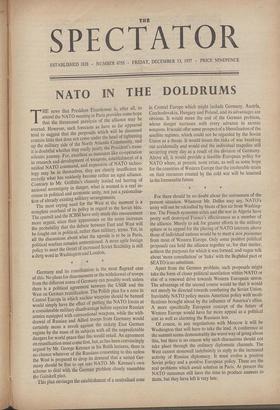NATO IN THE DOLDRUMS
THE news that President Eisenhower is, after all, to attend the NATO meeting in Paris provides some hope that the threatened paralysis of the alliance may be averted. However, such forecasts as have so far appeared tend to suggest that the proposals which will be discussed contain little that does not come under the head of tightening up the military side of the North Atlantic Community, and it is doubtful whether they really justify,the President's trans- atlantic journey. For, excellent as measures like co-operation in research and development of weapons, establishment of a unified NATO command, and expansion of NATO techno- logy may be in themselves, they are clearly insufficient to revivify what has suddenly become rather an aged alliance. Contrary to Mr. Griffiths's clumsily trailed red herring of national sovereignty in danger, what is wanted is a real in- crease in political and economic unity, not just a rationalisa- tion of already existing military arrangements. . The most crying need for the West at the moment is a complete overhaul of its policy in regard to the Soviet bloc. The sputnik and the ICBM have only made this reassessment more urgent, since their appearance on the scene increases the probability that the debate between East and West will be fought out in political, rather than military, terms. Yet, in all the discussions about what the agenda is to be in Paris, political warfare remains unmentioned. A more agile foreign policy to meet the threat of increased Soviet flexibility is still a dirty word in Washington and London.
* * Germany and its reunification is the most flagrant case of this. No plans for disarmament or the withdrawal of troops from the different zones of Germany can possibly work unless there is a political agreement between the USSR and the West on German reunification. The Polish plan for a zone in Central EurOpe in which nuclear weapons should be banned would simply have the effect of putting the NATO forces at a considerable military disadvantage before superior Russian armies equipped with conventional weapons, while the with- drawal of Russian and Allied troops from Germany would certainly mean a revolt against the rickety East German regime by the mass of its subjects with all the unpredictable dangers for world peace that this would entail. An agreement on reunification must come first, but, as has been convincingly argued by Mr. George Kennan in his Reith lectures, there is no chance whatever of the Russians consenting to this unless the West is prepared to drop its demand that a united Ger- many should be free to opt into NATO. Mr. Kennan's own scheme to deal with the German problem closely resembles the Gaitskell plan.
This plan envisages the establishment of a neutralised zone in Central Europe which might include Germany, Austria, Czechoslovakia, Hungary and Poland, and its advantages are obvious. It would mean the end of the German problem, whose danger increases with every advance in atomic weapons. It would offer some prospect of a liberalisation of the satellite regimes, which could not be regarded by the Soviet Union as a threat. It "would lessen the risks of war breaking out accidentally and would end the individual tragedies still occurring every day as a result of the division of Germany. Above all, it would provide a feasible European policy for NATO where, at present, none exists, as well as some hope for the countries of Western Europe that the intolerable strain on their resources created by the cold war will be lessened inthe foreseeable future.
_ For there should be no doubt about the seriousness of the present situation. Whatever Mr. Dulles may say, NATO's unity will not be rekindled by blasts of hot air from Washing- ' ton. The French economic crisis and the war in Algeria have pretty well destroyed France's effectiveness as a member of the alliance. Merely to ask for greater efforts in the military sphere or to appeal for the placing of NATO interests above those of individual nations would be to meet a non possumus from most of Western gurope. Only some positive political proposals can hold the alliance together or, for that matter, achieve the purposes for which it was formed, and vague talk about 'more consultation' or 'links' with the Baghdad pact or SEATO is no substitute.
Apart from the German problem, such proposals 'might take the form of closer political association within NATO or else of a renewed drive towards Western European union. The advantage of the second course would be that it would not merely be directed towards combating the Soviet Union. Inevitably. NATO policy means American policy with'modi- fications brought about by the influence of America's allies. A more specifically European concept of the future of Western Europe would have far more appeal as a political aim as well as alarming the Russians less.
Of course, in any negotiations with Moscow it will be Washington that will have to take the lead. A conference at the summit 'seems demonstrably the worst way of going about this, but there is no reason why such discussions should not take place through the ordinary diplomatic channels. The West cannot stonewall indefinitely in reply to the increased activity of Russian diplomacy. It must evolve a positive Soviet policy and a positive European policy. These are the real problems which await solution in Paris. At present the NATO statesmen still have the time to produce answers to them, but they have left it very late.






































 Previous page
Previous page